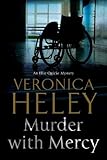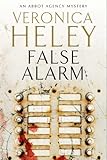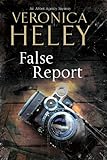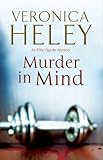|
Veronica Heley interview with Nancy Mehl
|
|
February 11, 2009
What inspired you to become an author? Did you feel called? I always knew I could write, but had to wait till I was grown-up and been out in the world earning my living, had married and borne a child, before I could allow myself time to learn how to do it. I was fortunate that it only took me two years of slog before my first book was accepted. Strangely enough, that very first book – Sue for Mercy – has now been picked up for a new edition in large print. I thought I’d be ashamed of it, thinking that I must have learned how to write better over the years, but it’s not too bad. The cover’s depressing, though. Sigh. As you know, writers have no control over what goes on the cover. You’ve written a lot of books. Do you enjoy writing as much now as you did at the beginning: How has the process changed over the years? I’m never as happy as when I’m writing and it’s going well. On the days it goes badly, and I have to re-write and re-write and cut, then?well, it’s not so good, but if you are a professional, then you have to keep working on the manuscript till it says what you meant, and does it in readable fashion. The hard work doesn’t ease up as you get more experienced – or perhaps I have grown more pernickety over the years? The biggest change for me has been from working on a portable typewriter (five books published) through an Amstrad to a modern computer; now there is progress for you. There are certain tricks of the trade which I now apply more carefully when I write. Yes, they help me to see my mistakes and correct them more quickly. What was your biggest challenge when you began writing: What is it now? My biggest challenge when I began was to satisfy my impulse to write stories, and that’s about the same now?oh, and earning some money to contribute to the family coffers. You’ve written in several different genres – and under another name. Do you have a favourite genre? Why or why not? I started in crime, and have returned to it because that’s what my publishers wanted thirty odd years ago, and that’s why my present publisher – Severn House – wants now. It’s the desire to see wrongs righted that pulls me towards gentle crime, and the need to create characters who are Christians trying to do their best in an indifferent world. I like to think readers will identify with my heroines and that when they finish one of my books, they will feel all the better for having read it. On the other hand, every now and then I see an opening for a children’s book, and seize it. I’ve just done the text for a pop up Noah’s Ark with Francesca Crespi for Frances Lincoln which will be out next autumn. I’m also trying to get some bible stories for children with modern life application off the ground. Who knows what will come next? How has the publishing industry changed over the years? Is it better or worse? I’m British, remember. The publishing industry here has changed in several ways. There are fewer independent bookshops, and a shrinking number of Christian bookshops, too, so many Christian writers go into mainstream, carrying their message with them overtly or not. Technology has made shorter print runs viable, but children’s colour books are now almost always co-productions, and printed on the other side of the world. The easy availability of self-publishing has created an influx of books which, on the whole, would have been improved by editing; they rarely give the writer a return on their outlay. Vanity publishing has flourished. There are fashionable trends, of course. Chick-lit has come and most of it has gone. The hard crime stories tend to be about nastier crimes, and the teenage books tend to deal with what we used to consider were adult problems. Tell us something about yourself that readers would be surprised to know. All right. Here it is. I am not Ellie Quicke, the heroine of nine – shortly to be ten – stories – the Ellie Quicke Mysteries from Severn House. Yes, there are some similarities in that I have never learned to drive, like to wear blue and white, and my hair is silver, but my own real daughter is nothing like Ellie’s daughter Diana. (Diana is so horrible that people frequently ask if she’s based upon my own daughter, but she isn’t. Right?) What is the most important thing you want to communicate to your readers? The most important thing I’d like to give my readers is my belief that a quiet spirit, at one with God, helps you to tackle whatever life can throw at you. Tell us about your latest novel, FALSE PICTURE. FALSE PICTURE was fun to write, partly because I was able to put my love for the city of Bruges in it. Bruges is where we holiday at least once a year, and where I buy my clothes – blue and white, remember? Well, sometimes grey, or peach. This book is in the new series: The Abbot Agency, also from Severn House. The heroine is very different from Ellie. Bea Abbot is widowed and in her early sixties, running a domestic agency which does not – repeat not – deal in murder?but always finds itself doing so. In this book an old friend asks Bea for help tracing her step-son who has disappeared along with a valuable painting which he appears to have stolen from his god-mother, who has been found dead in mysterious circumstances. Bea puts her good-hearted but noisy assistant Maggie on the trail, only to find the girl has been conned into carrying some stolen art treasures abroad (to Bruges). Can Bea locate her friend’s step-son, the missing portrait, extricate Maggie, the stolen goods and her new outfit, without falling foul of someone who already has several murders to his credit? You have another book, FALSE CHARITY, that is set to release on November lst. Give us an idea what it’s about. The first book in this series released in 07, and was called FALSE CHARITY, but the next one will be FALSE STEP, which is coming out some time in December. I never know whether a December release is a good thing or a bad! This is the one where Bea is called in to help one of her cleaners, who has found her client dead, wearing a pantomime-dame type dress, and with a pair of sparkly red shoes on the floor. He’s an old-fashioned entertainer suffering from cancer, whose wives, daughter and friends have conflicting views on his death. Why did he commit suicide in such a bizarre way? A complicated family situation takes some unravelling, but Bea gets help from an unexpected quarter. At the same time, her self-important member of parliament son returns home when his marriage breaks up, and her computer geek assistant Oliver goes through an identity crisis ? of name, not gender. What are you working on now? I’m now working on another Ellie Quicke mystery, to be called MURDER IN HOUSE. This is a darker-than usual story, involving a good look at how wealth and patronage can corrupt even those who start out with high ideals. Ellie herself is adjusting happily to re-marriage, but her daughter Diana continues to appal and horrify me. I had no idea, when I started writing this story, what Diana was going to get up to next, and yes, she managed to astonish even me! What does the future hold for Veronica Heley? The future – who knows? I have two more books under contract at the moment. But fashions can change overnight in this business, and maybe my style of gentle crime will not be needed so much in the future. Perhaps I’ll be able to get on with the bible stories that I’ve been thinking about for so long. God knows. I have to leave that to Him. Anything else you’d like to say? God bless. That’s it. |
Warning: getimagesize(https://www.thesuspensezone.com/image/nancymehl150.jpg): failed to open stream: HTTP request failed! HTTP/1.1 406 Not Acceptable
in /home/susans16/thesuspensezone.com/xxss_class/Utils.class.php on line 849
Warning: Division by zero in /home/susans16/thesuspensezone.com/xxss_class/Utils.class.php on line 856

 Veronica Heley celebrates the publication of her 77th book in June 2016, having been in the business for over 40 years. She is currently writing two gentle crime series set in different areas of London and four short stories a year for the Methodist Recorder. She has also written children’s and resource books, a biography, and some historical fiction, along with many articles and reviews. She’s involved with her local church and community affairs, likes to break for coffee with friends and does the garden when she has time. She has been a member of a book reading club for 40 years, but has decided that life is too short to read depressing literature any more.
Veronica Heley celebrates the publication of her 77th book in June 2016, having been in the business for over 40 years. She is currently writing two gentle crime series set in different areas of London and four short stories a year for the Methodist Recorder. She has also written children’s and resource books, a biography, and some historical fiction, along with many articles and reviews. She’s involved with her local church and community affairs, likes to break for coffee with friends and does the garden when she has time. She has been a member of a book reading club for 40 years, but has decided that life is too short to read depressing literature any more.











Leave a Reply